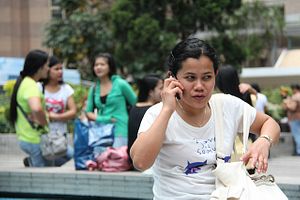As part of Beijing’s much talked about One Belt, One Road initiative, the first group of Cambodian domestic workers will arrive in Hong Kong this fall. On March 1 this year, the Hong Kong government dutifully relaxed visa restrictions for Cambodian workers, investors, and students.
An expected group of 1,000 Cambodian migrant workers will add to the city’s population of 330,000 domestic helpers this coming September and October. Domestic workers in Hong Kong are essentially maids that live with families. The workers will receive basic language, cooking and health care training for three months in Cambodia before arriving in Hong Kong, according to Simon Liu Wing-hing, chairman of the Cambodia Human Resource Development Association, which also serves as the official representative of the Cambodian government and a quasi-work rights protection agency for the Cambodian workers.
Some employment agencies have responded enthusiastically to the prospective new influx of domestic workers and maids. “There is an ever-increasing demand for domestic helpers from Hong Kong families … the supply of Cambodian domestic helpers can ease the situation,” Elain Fung, director of the Indo Indah Employment Agency, told the South China Morning Post.
Since the 1970’s Hong Kong has been importing a foreign workforce to work as maids under special visa arrangements, with the bulk of Hong Kong’s domestic worker workforce sourced from the Philippines and to a slightly smaller extent, Indonesia. Workers are paid a minimum allowable wage of HK$4,310 per month and are required to live with their employers. This first batch will serve as a test case for Cambodian domestic workers. It will not be the first time such an experiment will take place. In early 2014 Myanmar introduced its own overseas worker agreements with both Singapore and Hong Kong.
There is a wide body of evidence of domestic worker exploitation and abuse in Hong Kong. In an October 2016 report by the Hong Kong Federation of Asian Domestic Workers and Progressive Labor Union of Domestic Workers in Hong Kong, it was found that a large percentage of Filipino domestic workers interviewed were charged exorbitant amounts of money by placement agencies to secure employment in Hong Kong, despite it being illegal to charge more than 10 percent of one month’s salary as a recruitment fee; In addition to that, prospective workers are often compelled to undertake additional training prior to placement at their own expense.
In 2014, 20 charges were brought against Law Wan-tung, employer of Erwiana Sulistyaningsih and another Indonesian maid, Tutik Lestari Ningsih. In February 2016 Law was jailed for six years and fined HK$15,000 on 18 charges relating to the assault and intimidation of her domestic helper. She was found guilty of inflicting grievous bodily harm with intent among the long list of offences.
In September 2014, as a result of these charges, the Myanmar government banned all of their citizens from undertaking domestic worker duties in Hong Kong and Singapore, only seven months after it introduced the scheme.

































